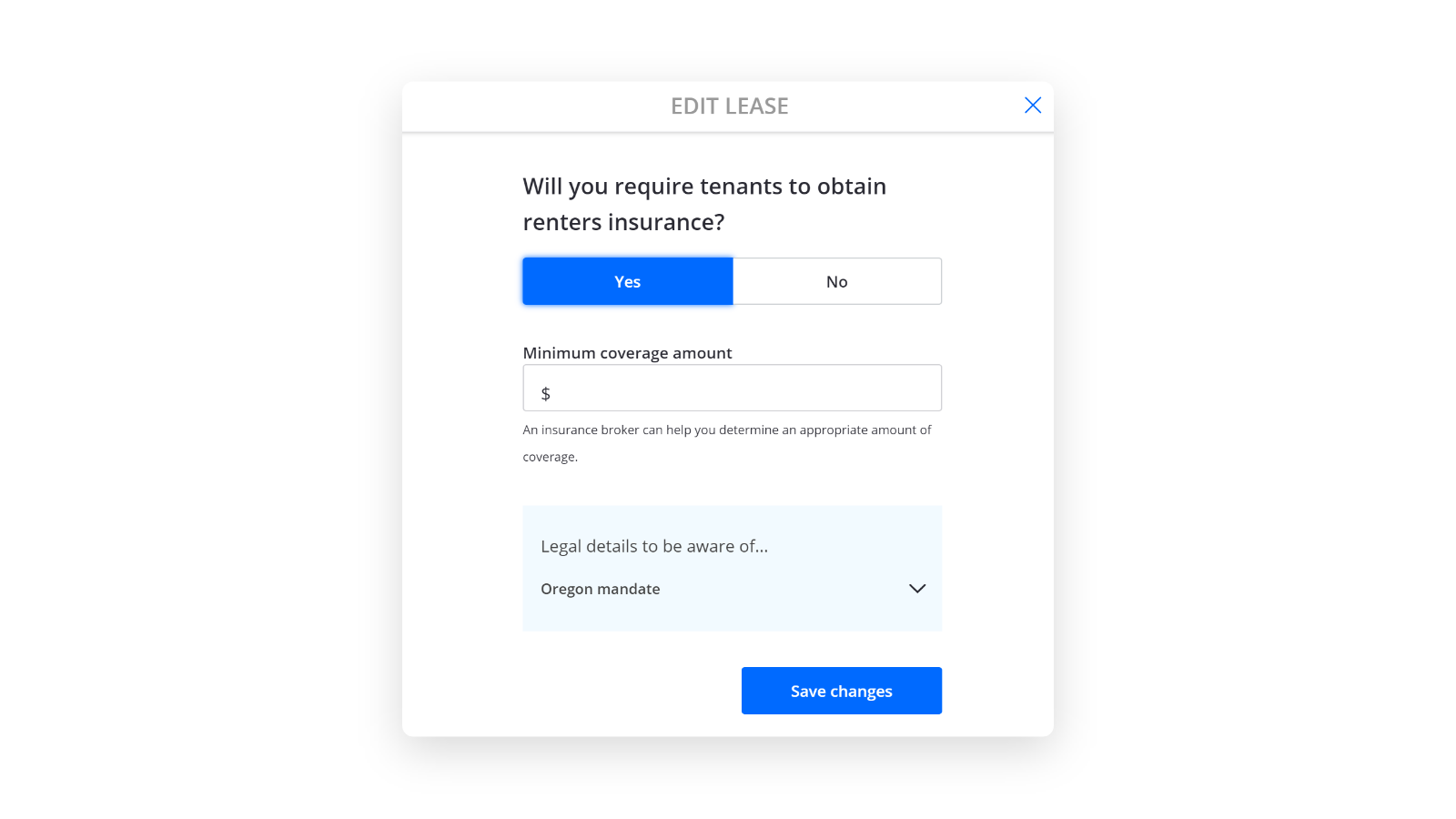Can Landlords Require Renters Insurance?

January 10, 2020
4 min read
Landlords can require tenants to carry renters insurance as long as it is specified in the lease and required of all tenants who live in the rental property. Renters insurance is not required by law, but a tenant with coverage can benefit both the landlord and the renter.
What is renters insurance?
Renters insurance is an insurance policy for tenants that is designed to help protect them from theft, damage or accident while living in a rental. Coverage typically includes:
Personal property coverage. This generally covers the cost of repairing or replacing a tenant's belongings in the event of theft or damage.
Liability coverage. This will cover a tenant if they are found liable for injury to another person or damage to another person's property.
Additional living expense coverage. If the tenant's rental is damaged and left uninhabitable, this coverage will generally pay for additional living costs such as a hotel bill.
Should landlords require renters insurance?
By requiring tenants to purchase renters insurance prior to moving in, you can increase your rental property protection — without adding to your own expenses. Many renters are under the misconception that they are protected under their landlord's insurance policy. However, landlord and homeowners insurance policies typically only cover the rental property building and not a tenant's personal property if stolen or damaged. Requiring tenants to carry renters insurance can be a huge relief for them in the event of theft, damage or an accident.
What are the benefits of renters insurance for landlords?
Here are some reasons why requiring renters insurance can be beneficial to a landlord:
Mitigates the risk of conflict. If a tenant's belongings are stolen or damaged, their renters insurance will generally cover the loss, whereas a tenant without renters insurance may look to you to help replace the items.
Reduces the risk of damage caused by a tenant's pets. A renters insurance policy should cover any damage done by a tenant's pet.
Provides peace of mind. Knowing that your tenants have a way to recover losses can lower your stress as a landlord.
What are the benefits of renters insurance for tenants?
If your tenants are asking, 'Why is renters insurance required?' you can educate them on the many benefits of renters insurance. Let them know that renters insurance may cover:
Hotel costs after a disaster. Some renters insurance policies cover additional living expenses and temporary housing if a rental becomes too damaged to live in.
Belongings away from the rental. Depending on the policy, a tenant's belongings may be covered even if the belongings are not inside the rental — such as items left in a car or taken on a trip.
Belongings the tenant borrowed. Generally, renters insurance policies cover belongings in the tenant's possession, so property that the tenant rents or borrows may also be covered.
Damage caused by a tenant's child. If a tenant's child damages property, it will generally be covered by a renters liability insurance policy.
Legal costs if a tenant is sued. Should someone get injured on your tenant's property and sue your tenant, the tenant's liability insurance policy may pay for legal costs up to the policy limit.
Medical expenses for injured guests. Some renters insurance policies provide limited coverage for medical costs if a guest is injured on the property.
How can you ensure your tenants are carrying renters insurance?
You can ask for proof of insurance every year when the tenant renews their lease to be sure they still have coverage. If you decide to require renters insurance, be sure your lease agreement says that your tenant must carry it. Consult a local attorney about the legal ins and outs of renters insurance, so you can better understand the coverage and limitations in your community.
How much renters insurance should a landlord require?
The amount of renters insurance coverage needed will vary based on each property and each tenant. Typically, it's recommended that the tenant carry personal property coverage sufficient enough to replace their personal belongings. For liability coverage, consider speaking to an insurance broker for help determining the appropriate amount of coverage for your rental. It's good practice to state the minimum coverage amount required in your lease agreement.
Keep in mind that the tenant's overall cost may increase depending on how much coverage you require them to carry, and in some areas you may also be required to maintain comparable liability coverage.
How much does renters insurance cost tenants?
Typically, renters insurance rates are between $15 and $30 per month, although costs will vary depending on:
- Location
- Property size
- Claim history
- Amount of coverage
For example, premiums can increase if the property is located in a flood zone or if tenants need to cover high-value items like jewelry or electronics.
How do you add renters insurance requirements to a lease?
You can work with a local attorney to include a renters insurance clause in your lease. With Zillow Rental Manager, you can use a customizable lease template online and specify whether renters insurance is required and how much coverage a tenant needs.

Because affordability can be a concern for renters, be sure to include this requirement in your rental listing. Renters insurance is an additional expense for your renter, so you need to be upfront about all the costs included in renting your property.
If prospective renters have questions about renters insurance, refer them to a licensed insurance broker. Their current insurance provider, if they have one for an automobile or other item, may offer renters insurance — making it easy to bundle different types of coverage.
Read more articles and tips on being a landlord at our Rental Resource Center.
Connect with us!
Learn how Zillow Rentals can help you reach your goals.
Stay informed. Stay ahead.
Access exclusive industry insights, market trends, and expert tips. Subscribe now to receive quarterly Zillow Rentals newsletters!